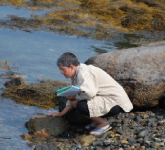COSEE-OS researches, tests, and builds systems to improve how scientists can contribute to the education enterprise. We have offered
scientist-lead professional development workshops for educators designed to reach inland
audiences with ocean content. Additionally, we have developed a
college course to
help young marine scientists to more effectively communicate their subject; encourage science majors to pursue professions where they
simultaneously serve science and education; and create a greater awareness among young scientists about the need for outreach.
Based on experience from these and other COSEE-OS initiatives, we have crafted a new model for workshops that includes specific professional
development for scientists including use of pedagogical techniques such as
concept mapping
and on-line collaboration
tools that promote sustained interactions with educators and
students. A key goal of COSEE-OS is to offer these "Scientist-Educator Workshops" at various venues and train facilitators at other
COSEE Centers to implement the workshops. Visit our
workshops page
for information on
past events; for upcoming
workshops, click
here.
COSEE-OS engages audiences in
free public webinars to help scientists and ocean
science content reach broader audiences. Since 2010, COSEE-OS has pioneered several webinar models, and continues to test the application of
webinars to different audiences. All that is needed to participate in a scheduled webinar is a phone and an internet connection. Participants
can ask questions and participate, making the session both interactive and informative.
Perhaps our most ambitious and innovative achievement has been development of the
Ocean Climate Interactive
which highlights fundamental sciences concepts as well as their "big picture" connections. This software tool ties directly to hundreds of
resources, including those for college-level audiences. Some of these resources have undergone extensive
review by teams of scientists and educators.
For more information, please contact
Annette deCharon.






